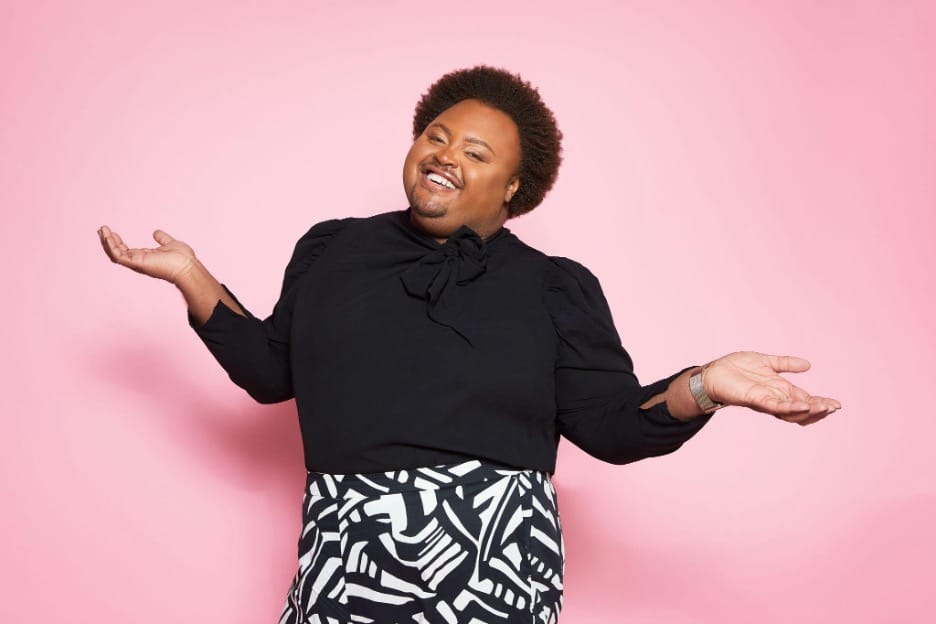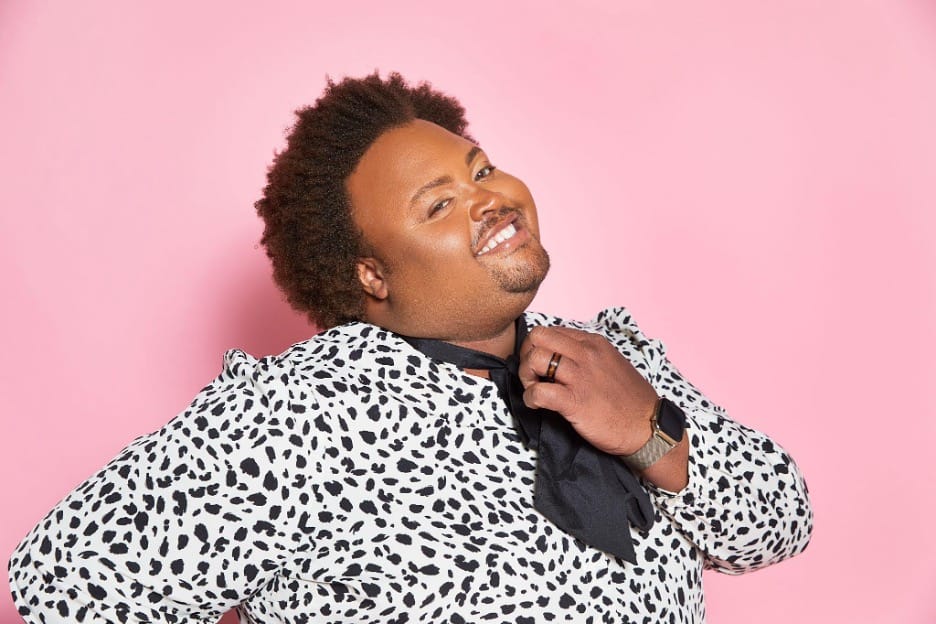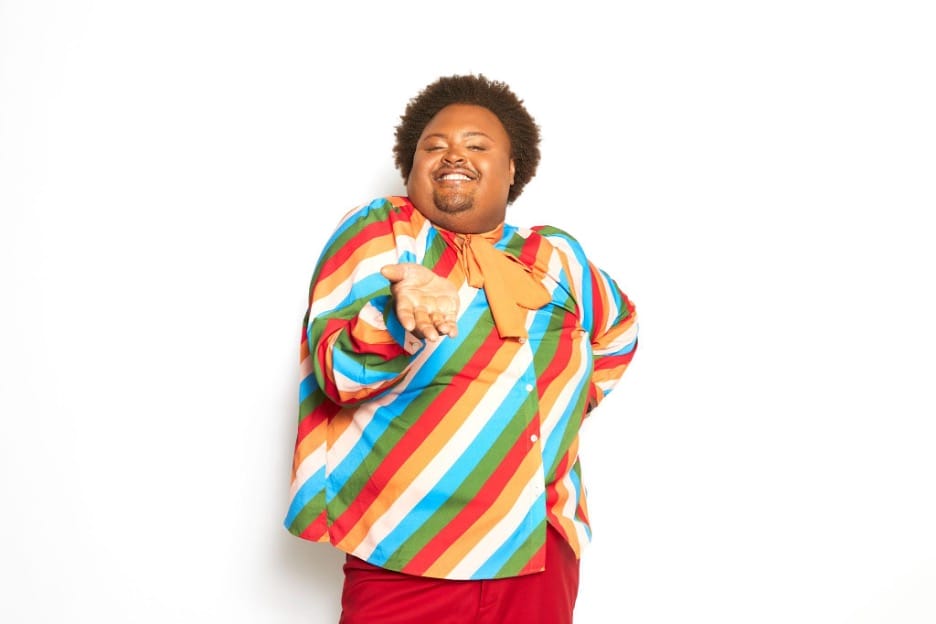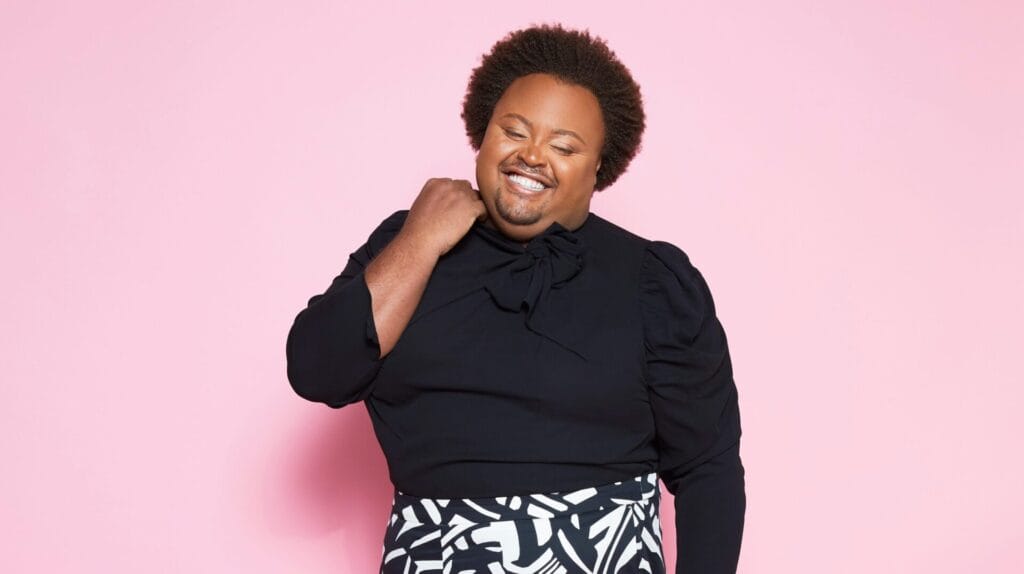Dr. Jon Paul Higgins is daring to go there—and claiming the space they so rightfully deserve. In their memoir, published last month, they share their truth with vulnerability, humor, and an unwavering commitment to self-love. It’s a story about what it means to fully exist in a world that often tries to shrink your brilliance. In today’s heavy and uncertain climate, Black. Fat. Femme. stands as more than just a personal narrative. It is also a celebration of queer joy, and not the curated kind. Instead, it’s the kind that is rooted in survival and showing up for yourself even when the world doesn’t. Dr. Higgins isn’t chasing anyone’s expectations. They’re living fully, on their own terms, and reminding us that joy, in all its forms, is a powerful act of resistance.

GLAAD: The title of your book, Black. Fat. Femme., is bold. How did you arrive at a place where you felt ready to claim and celebrate blackness, fatness, and femininity so proudly?
Jon Paul Higgins: I think the podcast and the book are sisters. To read the book, and then to listen to the podcast, you can go, ‘oh, okay, I have a better understanding of Jon as a creator,’ –and to answer your question more directly, I’ll say the answer is found in chapter seven. It’s the conversation with my therapist who is Black and queer that helped me understand the intersections of my identity and the beauty in them. After years of feeling like it was something that I should dial down, my therapist got me to a place to understand that a lot of what I was led to believe to be a problem around my identity was, in turn, what made me the beautiful person that I am. It wasn’t necessarily about unlearning the stuff that came with the notion of being black, fat and femme. Instead, it was this idea of seeing all three of those identities as intersections. That’s what makes life what it is for me, whether it be hard or beautiful. I don’t think that I would be half of the person I am without those three identities, and that’s why I settled on that title for the book.
GLAAD: I have chapter 7 of your book noted as well! You talk about becoming “that bitch” through your work in therapy. What did finding the right therapist teach you about your own strength and healing process?
JPH: I think we –as marginalized people– are so used to getting scraps and the world telling us that all we deserve is scraps. I’m not saying that that’s everyone’s story, but a lot of the non binary, queer, trans, Black people that I’ve talked to were used to getting scraps. I had to advocate for myself to find the right therapist. After having two or three different therapists who were hitting me with microaggressions, I had to go back to my healthcare provider and say, “These people are not helping me. Find me someone who will,” and it took several times of me having to call into their mental health services saying, “this ain’t gonna work.” I advocate for myself and my lived experience in my everyday life by telling people how to treat me and how to respect me and my identity. It was the same way in terms of finding a therapist. I had to be my biggest champion because I knew I needed that in order to stay here and to stay alive.
GLAAD: At one point in the book, you describe a moment where you realize the TV lied to you about queerness, especially in terms of the intersections of race, religion, and fatphobia. What do you want today’s queer youth to know that you wish that you had known then?
JPH: I want them to know that folding into elements of whiteness and white beauty standards is not the thing that determines if your life is better or not . I wish someone would have told me this when I was younger. The more you try to assimilate into the version of whiteness that you think is going to get you the love or the life you want, your life is still going to be hard. You’re still going to have struggles that people don’t know how to unwrap. There are going to still be things in your life that only you as a Black queer person will have to deal with. No matter how white you think you are in your head. I wish that somebody would have tapped me and said, “Girl, love your Blackness, love your queerness, love your fatness, the way you choose to love it based on your own identities and lived experiences.” I don’t think I would have had to write chapters 3,4, and 5, if somebody would’ve done that.

GLAAD: There’s a strong connection between icons Latrice Royale and André Leon Talley in your work. What have those figures represented for you in terms of visibility and resilience?
JPH: The only work that comes to mind is power. There is something so powerful about the space that they take up in both drag and also in the fashion industry. There’s something to be said about the ways that both of them have owned their size, and I don’t mean that just by the size of their bodies. When they come into the room, they demand to be respected. It’s something that, as a Black fat queer person, for years, I thought was a problem. When you tell people “no girl, you’re gonna respect me,you’re gonna respect the talent. You’re gonna respect the legacy that’s here.” I initially thought I couldn’t do that, and watching both of them has allowed me to say it. What’s funny is Tre’vell (Anderson) has pulled me to the side several times and asked “Girl, when are you gonna own who the f*ck Dr. Jon Paul is?” and through writing the book, I got it. Being able to reflect on Latrice and Andre, I get it in a different way. It’s not just this idea of saying you need to respect the work I’ve done, but respect this idea that I have gone through all of this to get here, and for me to be here is a benefit to you.
GLAAD: Since we’re on the topic of media figures, as someone who analyzes and critiques media deeply, what current shows or characters do you think are finally getting it right when it comes to representation?
JPH: Getting it right is hard, because ain’t nothing really out there for us right now. I think the last season of Sex Education was a great example of what I want to see more of in terms of Black ideologies around Black queerness and ‘figuring it out.’ The latest season really helped me understand this idea of how I engage religion, friend, and family expectations. It’s just a really great coming-of-age show.
GLAAD: I know that you are married, but in the book you explore themes of dating and desirability. How have your past interactions shaped the way that you viewed desirability and romantic love?
JPH: It’s hard because we all want to be desired to some capacity. Even if it’s not in a relationship, we want people to like us. I think that there’s something to be said about the idea of ‘if you can’t love yourself, how can you love somebody else?’ I challenge people to be cautious with that because so many of us don’t get the luxury to love who we are. So many of us don’t have the privilege to be in a space to have people celebrate all that comes with us. I like to tell people to give yourself grace and allow yourself the space to become the person you want to be, for the person you want to be. My partner and I are going on 15 years, and we’ve allowed each other to change. We’ve become different people over, and over, and over, again. I allow Jonathan to be who they are, and I learned to work with and embrace that. Desirability is a slippery slope, and it is something that I constantly think about… even in my own career. If I looked a certain way, or if I moved a certain way in this industry, how much more successful would I be? I believe it’s important to get to a place where you can say, ‘I am who I am, and the person that wants to find me and love me is going to be okay with the ever evolving parts of me.” That’s when life, love, and all of the things fall in place.

GLAAD: Chapter 8 focuses on resilience and authenticity. How do you personally define self love today, and how do you practice it?
JPH: One of the biggest things is using my voice to advocate for myself. I use the 48 hour rule. If something is bothering me 24 hours after the fact, and if I’m still thinking about it well into the 48th hour, then that means it really got to me and I need to address it asap. I try to use that rule as a measure of self love to make sure that I’m protecting myself. I’m also very intentional about the spaces I put myself in. A lot of people don’t want good for you. I have learned that not a lot of people want to see you successful, and not a lot of people are going to help you be successful. I have been giving myself the space for audacity. I talk about that towards the end of the book by reminding myself that I have the right to be the celebrity in my head that I want to be. For years I was trying to dim that light and be fake humble. Part of my self love is saying ‘no girl, you are her. You’re doing it!’
GLAAD: If your life had a theme song based on this book, what would it be and why?
JPH: Beyoncé’s Formation is the only song that comes to mind for me as a theme song because it helped me understand this notion of what people think and believe to be true about you. It’s like Beyoncé’s call-and-response to herself about how she wants to move in this world and how she needs to move in this world. The song ties into this book the idea of if you stay ready, you ain’t got to get ready. I genuinely believe that that’s what her intention was in that song, so I’m trying to stay ready for whatever’s coming my way. I’m trying to keep doing the things and encouraging folks to be who they are and in the process while also reminding myself that I have the right to be here. I have a right to celebrate where I am.
This interview has been condensed and edited for clarity.













